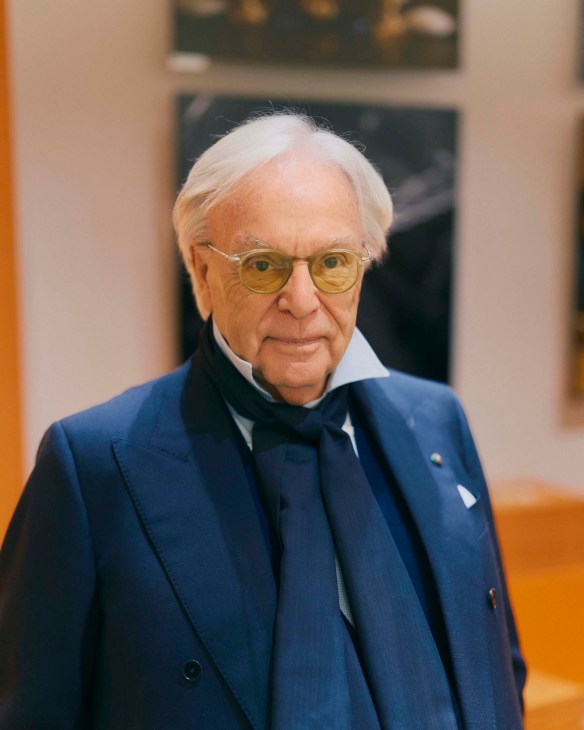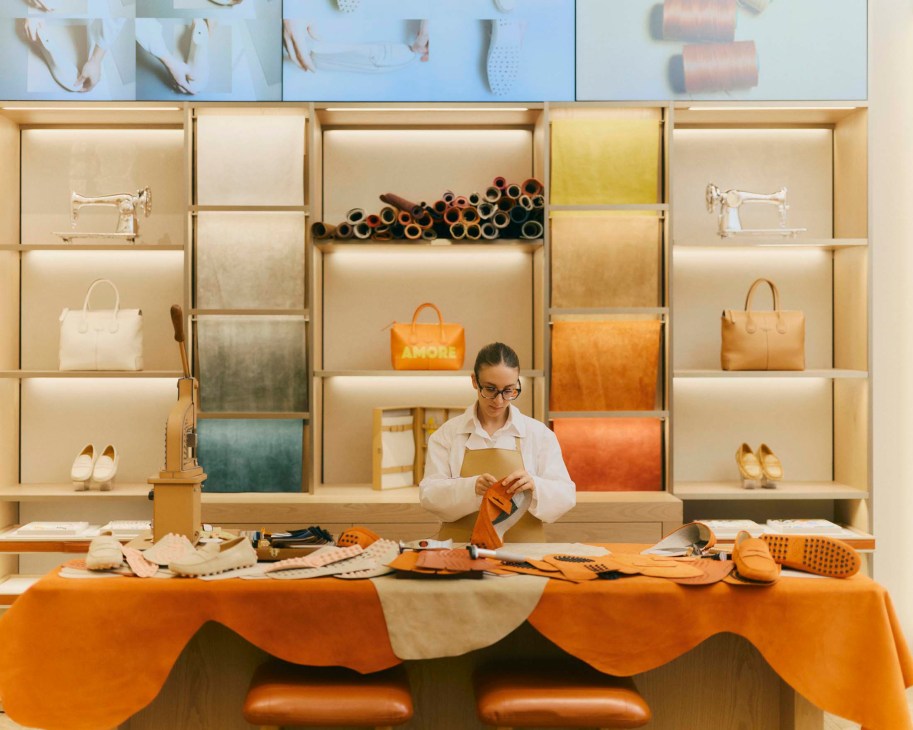How Diego Della Valle grew Tod’s into an Italian success story
The fashion patriarch reflects on the changes taking place inside his family’s fast-growing luxury house, as well as on its most enduring values.
The Milan offices of Italian fashion house Tod’s feel more like a high-end hotel than a commercial HQ. On the third floor of the Corso Venezia palazzo, past immaculate wooden and marble fixtures, Monocle is being served coffee in a light-filled room while awaiting the arrival of the brand’s patriarch and group chairman, Diego Della Valle, the third-generation family owner. He soon walks in through a side door, dressed in a navy blazer, his shirt collar riding up over a dark silk scarf. He sits down at the head of our table, placing a yellow notepad headed with his initials in front of him.

Della Valle oversees an Italian success story. In 2023 Tod’s reported annual sales of about €560m, while group figures (the Tod’s Group portfolio also includes labels such as Paris-based Roger Vivier and Hogan) topped €1.13bn. The company, which Della Valle’s grandfather started as a humble cobbler’s workshop, is now a global powerhouse. It’s still renowned for its shoes but has also branched out into everything from bags (Princess Diana was a fan and has a bag named after her) to ready-to-wear, the latter since 2005. The company is based in the family fiefdom of Casette d’Ete in the central Marche region and production remains in the area to this day.
Its continued investment in Marche’s artisan community, known for its mastery of leather, is what sets the company apart, says Della Valle. “We’re always looking to do difficult things,” he says, in a hushed, considered tone. “That means products that are difficult to make and also hard to copy.” He adds that, unlike a bag with a big logo emblazoned on the side, you can’t fake superior quality. “Every leather hide is different.”
As you might expect from a fashion player such as Tod’s, embodying Italy’s lifestyle – including its craft prowess, as well as its flair for quality and slower living – is part of its raison d’être. Indeed, one of the reasons why we are sitting around the table at the Milanese outpost of Tod’s is to celebrate the company’s new book, Italian Hands, the latest instalment in its coffee-table collection. The book tells the stories of Italian creatives and the artisans with whom they collaborate, from a glassblower in Murano to a master of terracotta. The limited-edition book, which puts the spotlight on what Della Valle calls “Italian good taste”, is filled with images of bag straps being braided, Gommino loafers being stitched and ceramicists’ brushes being dipped in sunny yellow pots of paint. The idea is to capture the company’s ethos of celebrating handcraft. There are barely any commercial or marketing objectives, with the edition only available to private customers.
For Tod’s, investing in the quality of life of in-house talent, as well as that of the broader community, is a priority. Whether it’s providing a crèche at the Marche headquarters and helping build an elementary school or financing the restoration of the Colosseum in Rome and Milan’s city hall, Della Valle is a strong believer in the positive social and cultural impact that successful companies can make – an ethos once followed by the likes of Olivetti and more recently Zegna, which has invested heavily in the Piedmont countryside. Della Valle talks about “the leadership role” that powerful companies must assume and the importance of helping to build something for their countries.
The publication of Italian Hands is also designed to celebrate the Gommino shoe – perhaps the best-known product in the Tod’s portfolio. Blending a leather driving loafer with a more technical rubber-studded sole, it became an instant hit on its launch in the late 1970s. The key was creating a shoe that could accompany both dress-up and dress-down looks and, by extension, be used throughout the whole week.
“At the time there was a world of elegant things but they were all formal,” says Della Valle. “And then there were things for the weekend but they were almost always technical and sporty. So what we did, quite intentionally, was to turn designs that were originally used for moments of relaxation into products that could also be worn with work clothing.” Part of the job involved what he calls “nobilising” rubber, which had previously been looked down upon in bourgeois circles, despite how practical and versatile it could be. Today you’ll spot as many pairs of Gommino shoes in boardrooms as you will in beach clubs – the most stylish wearers usually pairing them with linen shirts and bright-coloured trunk shorts, only to swap them for open-toe sandals moments before stepping on hot sand.
Della Valle might have been central to the Gommino’s genesis but he likes to credit the team around him, as well as his father, Dorino, who died in 2012 at the age of 87. Together they created a design icon that allowed Tod’s to enter fashion’s big leagues. However, around the same time in the early 1980s, Della Valle realised that the company needed to move beyond the family surname that it was using at the time. “My only request was to have a short name that was easy to pronounce,” says Della Valle. The idea was to move on to something that better reflected the company’s increasingly international market.
In 1984 the company was rebranded and renamed JP Tod’s (the initials were officially dropped in 1997), a choice that has plenty of lore around it. Some have suggested that the name was picked from a US phone book – a story that Della Valle says is only true in part. “Having a name that was a bit Americanised was a concept that was very much in vogue at the time among the big brands,” he says. “The people who came up with [our rebrand] were me, the typographer from my village and the owner of the printing press. Now there are 3,000 people doing that work.”

Like most large companies that are invested in makers, Tod’s has a talent pipeline to think about. Ensuring that people have “the desire to do [the work]” is at the forefront of Della Valle’s mind as he tells Monocle about the pride of the sewers who work at the Marche factory. Bottega dei Mestieri, a programme created in 2012, is a key part of this nurturing process. Artisans nearing retirement are paired with interns who often go on to work for the brand. “Young people give a bit of energy to the [older artisans] and they give back their wisdom in return,” says Della Valle, adding that instead of simply asking workers to show up and put their heads down, the scheme fosters dialogue between generations. “The artisan manages his own hands,” says Della Valle, turning philosophical for a moment. “It is very important for young people to understand the concept that if you are a craftsperson, you are truly free.”
As well as its nationwide largesse, Tod’s continues to build abroad. Recently the brand explored digital product passports to ensure that its supply chains are more traceable. It has also shaken up its ready-to-wear offering, with Matteo Tamburini, formerly of Bottega Veneta, joining as creative director in 2023.
Meanwhile, last year, Tod’s Group made the decision to delist and go private – a move that involved Della Valle stepping away from his role as CEO. (John Galantic, formerly of Chanel, now holds this position.) “It was the right moment to leave [the stock exchange] because we need to invest a lot in future development, which potentially is enormous,” says Della Valle.
As for what that future looks like, the chairman of the board and owner won’t give too much away, though he admits that he is interested in furniture and leather jewellery. And while he might be slightly less involved in the day-to-day running of the company these days, there has been no dip in his enthusiasm and his travel itinerary remains packed. He is already planning a swift return to Marche following his meeting with Monocle, then on to Morocco.
The key thing seems to be to stay true to what the brand does best: producing wares to the highest standard and achieving that delicate balance between novelty and continuity. “It’s important for companies like ours to never betray the quality,” says Della Valle, summing up his – and by extension, the company’s – ethos. “And we need to be absolutely modern.”
tods.com


